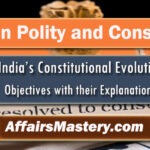Comprehensive Indian Constitutional Articles and Schedules MCQs | Set 3
Unlock Your Knowledge: Comprehensive and Important MCQs on Indian Constitution Articles and Schedules. Articles and Schedules plays a huge role in shaping Indian Polity and Governance, and it’s one of those things that really lays the groundwork for doing well in competitive exams—whether it’s Civil Services, State exams, SSC, Railways, Banking, or any of the others out there.
Diving deep into Indian Polity, Constitution, and governance isn’t just about memorizing facts or ticking boxes for exams, but more about developing the kind of awareness that can make navigating these challenging exams a little less overwhelming and a lot more manageable.
| MCQs on Indian Constitution Articles and Schedules – Objective Questions and Answers |

Q21. Which of the following is not correctly matched? (U.P.P.C.S. (Pre) 2019)
[A] Public Health and Sanitation -> State List
[B] Census -> Union List
[C] Allocation of seats in the council of States -> Second Schedule
[D] Anti-Defection -> Tenth Schedule
View Explanation
Correct Answer is C.
- Public Health and Sanitation → State List (Correct)
- Public health and sanitation are subjects under the State List (Entry 6 of List II in the Seventh Schedule).
- Census → Union List (Correct)
- Census is a subject under the Union List (Entry 69 of List I in the Seventh Schedule).
- Allocation of seats in the Council of States → Second Schedule (Incorrect)
- The allocation of seats in the Rajya Sabha (Council of States) is mentioned in the Fourth Schedule of the Constitution, not the Second Schedule.
- The Second Schedule deals with the salaries and allowances of high constitutional authorities like the President, Governors, Judges, etc.
- Anti-Defection → Tenth Schedule (Correct)
- The Tenth Schedule of the Constitution deals with the Anti-Defection Law, which was added by the 52nd Amendment Act, 1985.
Q22. Which of the language is not included in the VIII Schedule of the constitution? (Chhattisgarh P.C.S. (Pre) 2018)
[A] English
[B] Hindi
[C] Sanskrit
[D] Urdu
View Explanation
Correct Answer is A.
- The Eighth Schedule lists the officially recognized languages of India.
- Hindi, Sanskrit, and Urdu are all part of the Eighth Schedule.
- English, however, is not listed in the Eighth Schedule, even though it is widely used for official purposes in India.
Q23. Coelho case is related to which Schedule of the Constitution of India? (U.P. P.C.S. (Mains) 2017)
[A] Seventh
[B] Eighth
[C] Ninth
[D] Tenth
View Explanation
Correct Answer is C.
- The I.R. Coelho v. State of Tamil Nadu (2007) case dealt with judicial review of laws placed under the Ninth Schedule.
- The Ninth Schedule was originally added by the First Amendment (1951) to protect certain laws (mainly land reforms) from being challenged in courts.
- However, in this case, the Supreme Court ruled that even laws placed under the Ninth Schedule after 1973 (following the Kesavananda Bharati case) can be reviewed by the judiciary if they violate fundamental rights.
Q24. To give constitutional protection, state land reforms laws have been included in the – (U.P.P.C.S. (Mains) 2003)
[A] 7th Schedule
[B] 9th Schedule
[C] 8th Schedule
[D] 10th Schedule
View Explanation
Correct Answer is B.
- The Ninth Schedule was added through the First Constitutional Amendment Act, 1951.
- It was created to protect land reform laws from judicial review and challenges under fundamental rights.
- Many state land reform laws, particularly those related to abolition of the Zamindari system, were placed under this schedule to prevent courts from striking them down.
- However, after the I.R. Coelho case (2007), laws placed in the Ninth Schedule after 1973 can still be reviewed if they violate fundamental rights.
Q25. The Ninth Schedule was introduced in the Constitution of India during the prime minister ship of : (I.A.S. (Pre) 2019)
[A] Jawaharlal Nehru
[B] Lal Bahadur Shashtri
[C] Indira Gandhi
[D] Morarji Desai
View Explanation
Correct Answer is A.
- The Ninth Schedule was added through the First Constitutional Amendment Act, 1951.
- It was introduced to protect land reform laws and abolition of the Zamindari system from being challenged in courts under fundamental rights.
- Jawaharlal Nehru was the Prime Minister of India at that time (1951) and played a key role in its introduction.
Q26. Match the following : (60th to 62nd B.P.S.C. (Pre) 2016)
| I. Union List | A. 97 entries |
| II. State List | B. 47 entries |
| III. Concurrent list | C. 66 entries |
[A] I-A II-B III-C
[B] I-A II-C III-B
[C] I-A II-A III-B
[D] I-C II-B III-A
View Explanation
Correct Answer is B.
The Seventh Schedule of the Indian Constitution divides subjects into three lists:
- Union List (Originally 97 entries, now 100 after amendments) → Matters under the exclusive jurisdiction of the Central Government (e.g., defense, foreign affairs, banking).
- State List (Originally 66 entries, now 61) → Matters under the State Government (e.g., police, public health, agriculture).
- Concurrent List (Originally 47 entries, now 52) → Matters where both Union and State Governments can legislate (e.g., education, marriage, bankruptcy).
Q27. Under the Constitution of India, Economic Planning is a subject: (Uttarakhand P.C.S. (Pre) 2002)
[A] In the State List
[B] In the Union List
[C] In the Concurrent List
[D]Not specified in any list
View Explanation
Correct Answer is C.
- Economic Planning is listed in Entry 20 of the Concurrent List under the Seventh Schedule of the Indian Constitution.
- This means that both the Central and State Governments have the power to make laws on economic planning.
- The Planning Commission (now replaced by NITI Aayog) was set up by the Central Government, but states also have their own economic planning mechanisms.
Q28. Prevention of cruelty to animals is listed in which list of the Indian Constitution ? (66th B.P.S.C. (Pre) (Re- Exam), 2020)
[A] Union List
[B] State List
[C] Concurrent List
[D] Preamble
[E] None of the above / More than one of the above
View Explanation
Correct Answer is C.
- Prevention of cruelty to animals is listed under Entry 17 of the Concurrent List in the Seventh Schedule of the Indian Constitution.
- This means that both the Central and State Governments have the power to make laws regarding animal welfare and protection.
- The Prevention of Cruelty to Animals Act, 1960, a central law, was enacted under this provision to prevent unnecessary pain and suffering to animals.
Q29. Which of the following is the subject of Concurrent List? (Chhattisgarh P.C.S. (Pre) 2011)
[A] Police
[B] Criminal Matters
[C] Radio and Television
[D] Foreign Affairs
View Explanation
Correct Answer is B.
- Criminal Matters are a subject of the Concurrent List (Entry 1 of List III in the Seventh Schedule).
- Both the Union and State Governments can legislate on criminal laws, such as the Indian Penal Code and other related laws.
Q30. Which of the following Entry is subject of Concurrent List- (I.A.S. (Pre) 1993)
[A] Population control and family planning
[B] Public health and sanitation
[C] Per-person Tax
[D] Treasure Travel
View Explanation
Correct Answer is A.
- Population control and family planning is listed in Entry 20 of the Concurrent List (List III) of the Seventh Schedule of the Indian Constitution.
- This allows both the Union and State Governments to legislate on this matter.
- Public health and sanitation is a subject in the State List (Entry 6 of List II).
- Per-person Tax is typically a matter that falls under the Union or State List, depending on the nature of the tax, but it is not specifically mentioned in the Concurrent List.
- Treasure Travel (or travel and tourism) is generally not directly mentioned in the Concurrent List, though some related matters could be.



